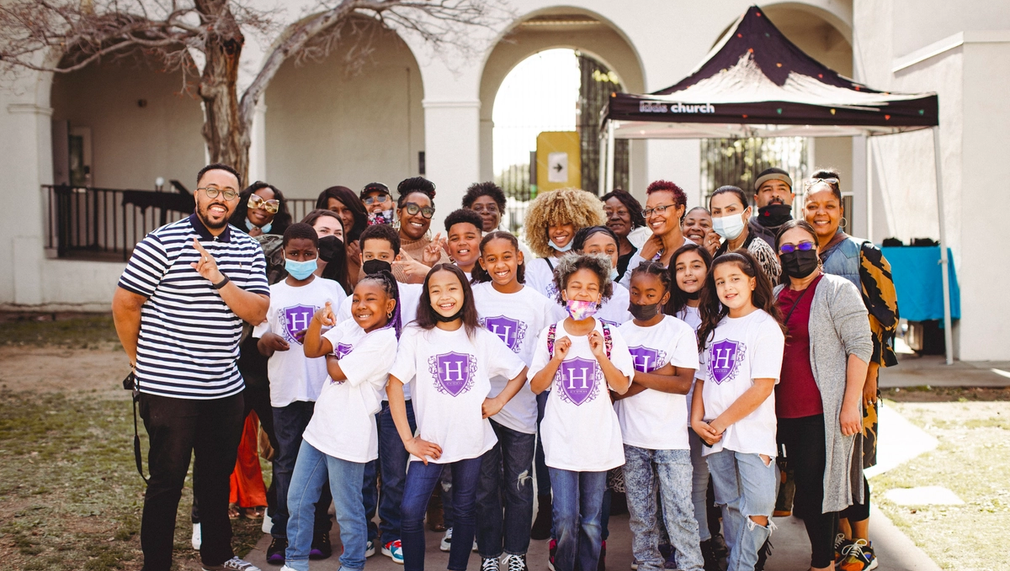Harambee Ministries Youth Programming
Harambee seeks to nurture and equip our participants in a way that will holistically serve the community, in order to achieve the rebuilding of urban neighborhoods. We accomplish this through many different initiatives, however, for the sake of this grant we will highlight two programs: “After the Bell” (safe after school programming) and “Power Talk” (gang intervention and SEL speciality class). These programs are provided to at-risk students referred to our programs because of their high likelihood of suspension.

What is the primary issue area that your application will impact?
Community Safety
In which areas of Los Angeles will you be directly working?
San Gabriel Valley
In what stage of innovation is this project, program, or initiative?
Expand existing project, program, or initiative
What is your understanding of the issue that you are seeking to address?
According to the Poverty and Race Research Action Council Report from March 2018, 60% of students in PUSD qualify for free or reduced lunch. In order to qualify for these programs their family income must be less than $46,435/yr (for a family of 4). Recent data from the 2019 Community Health Needs Assessment indicates that the zip codes 91103 and 91101 had the highest rates of children living in poverty in the service area (28.2% & 25.4%, respectively). PUSD iReady ELA Diagnostic Scores released for grades 1 - 5 for the school year '20-'21, show 62.82% of students who are socioeconomically disadvantaged are below reading level for their grade. 72% of our current program participants fall into the Free and Reduced lunch category. After the Bell provides a safe and enriching learning environment for students who fall into those statistics. Power Talk is designed to challenge unhealthy belief systems and values. The classes are designed to be either intervention or prevention focused.
Describe the project, program, or initiative this grant will support to address the issue.
“After the Bell” is our After school program. ATB is founded on two guiding principles: scholarship and leadership. The ATB provides a culturally responsive curriculum that empowers scholastic improvement, character development, and intergenerational leadership. Our staff provides academic plans and pathways so that parents can help their students reach their goals. This program culminates in a Performing Arts showcase at the end of each season. Power Talk is a pull out class that our students attend during the school day. There, we discuss growth mindset, the power of affirmations, empathy, and leadership principles that will prepare them for real world scenarios. Our elementary classes are focused on preparing at-risk students to develop security in their identity that teaches them to make decisions that repel negative outside influences. Classes average 20 -30 students per session. At the middle school level our class is focused on intervention. Among students in the PUSD (grades 7, 9, and 11) in the academic year '17-'18, 14% reported being in a physical fight within the last 12 months, 11% had seen a weapon on campus, and 2% reported gang involvement (2019 Community Health Needs Assessment). Through relationships, we understand that our children are already under the power of negative influences. Our focus is to attack those systems that already influence the lives of our children. PT is laid out so that our students can learn how to weigh the cost of their choices.
Describe how Los Angeles County will be different if your work is successful.
Success for our program looks like our students increasing in their sense of self worth. There are very clear school to prison and school to gang pipelines in our community. We seek to create a space where our students can see that they are valuable and that their education is valuable in an attempt to interrupt those destructive pipelines. Our staff are specifically trained in Social-Emotional Learning (SEL) modalities. This holistic approach allows our program to care for our children and identifies challenges that may exist in their lives. We believe that SEL is helpful, but is maximized when applied through a culturally relevant lens. This is because students begin to disassociate their identity from academic spaces when they don’t see themselves represented in those spaces. Our goal is to expose our children to as many different disciplines, diverse leaders, and experiences to broaden their horizons and help them see how big the world is and that they have a valuable place in it.
What evidence do you have that this project, program, or initiative is or will be successful, and how will you define and measure success?
For After the Bell, we are measuring success through registrations as well as pre and post test assessments. We collect report cards and we utilize PUSD iReady testing diagnostics as they become available from the parents. For Power Talk, we rely heavily on attendance records, pre/post test assessments from students as well as assessments from teachers and administrators that we partner with. Our Power Talk post-test assessments have revealed that when our kids are asked “What skill do you think you’re not good at?” Our students respond overwhelmingly: “School, Math, and Life”. According to our post-test assessment, 69% of our Power Talk students reported the following statements are now true about themselves: “I am more aware of how my thoughts affect me.”, “I have a stronger vision for my future.”, “I work harder in school.”
Approximately how many people will be impacted by this project, program, or initiative?
Direct Impact: 350
Indirect Impact: 800